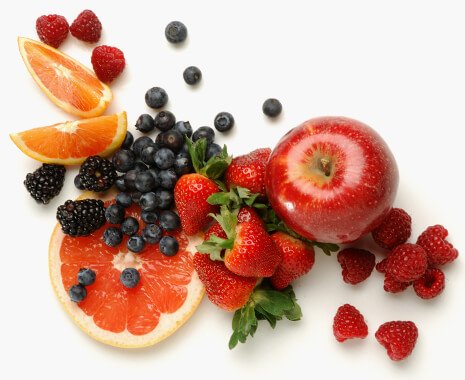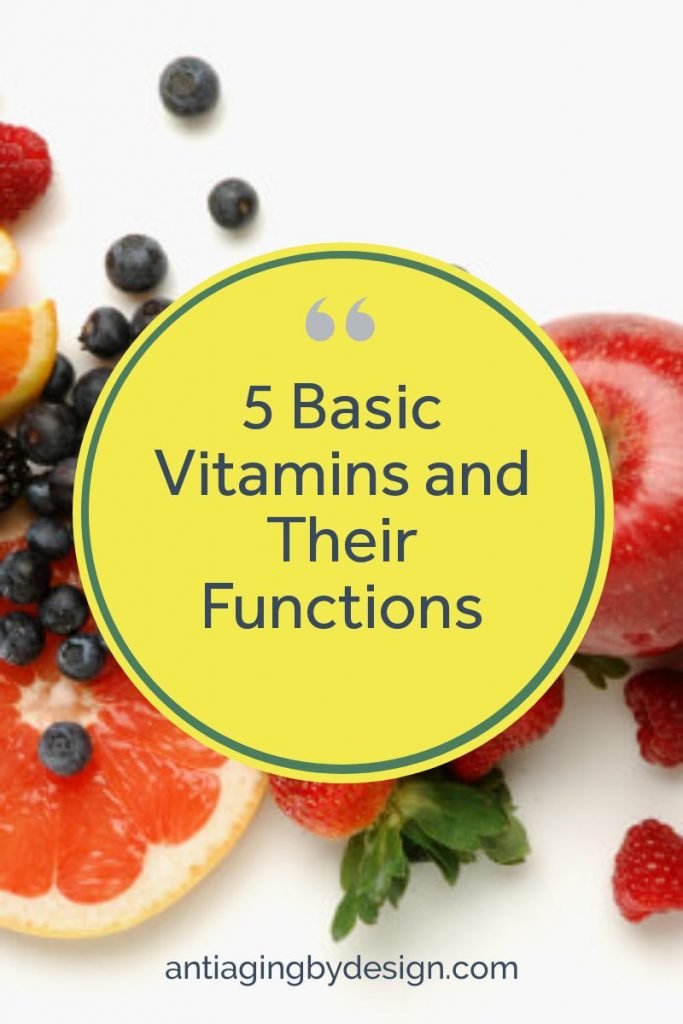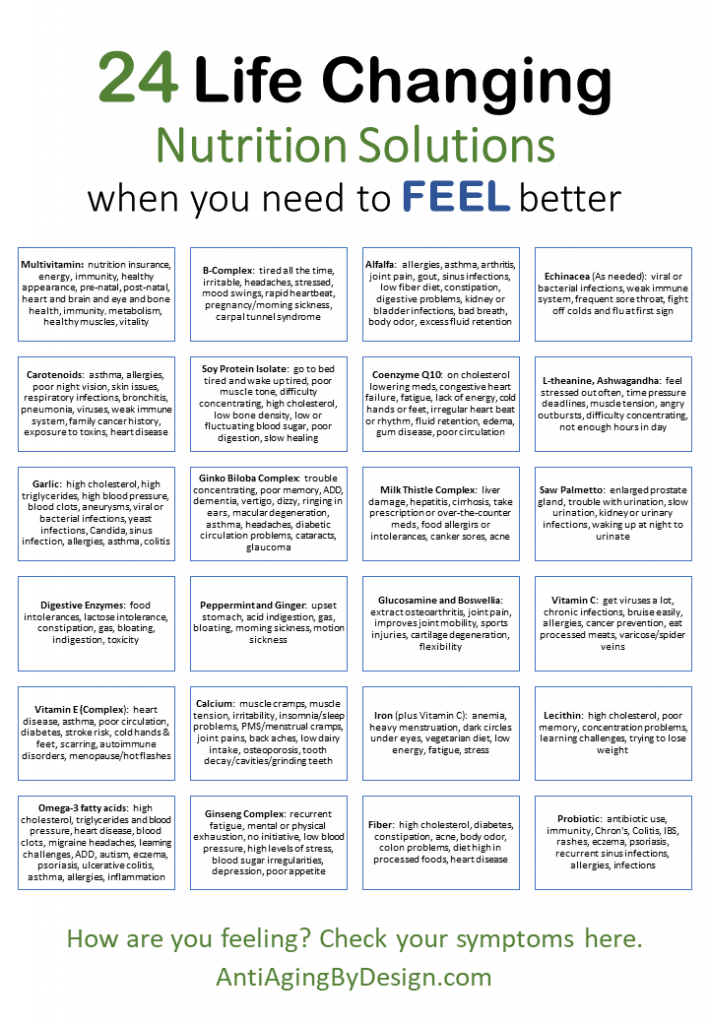Here is a list of vitamins and their functions so you can determine if you need to supplement with them.
List of Basic Vitamins
- Vitamin A
- Vitamin D
- Vitamin E
- Vitamin B
- Vitamin C

What are some basic functions of each vitamin?
Vitamin A: one critical function is the formation of and maintenance of epithelial tissue that seals off the body from infections. What is epithelial tissue: skin, the mucous linings of the mouth, stomach, intestines, respiratory, genital and urinary tracts.
Vitamin D: sometimes called the bone vitamin, vitamin D helps to make the minerals calcium and phosphorus available in the blood which constantly bathes the bones so that the minerals can be deposited there to harden as the bones grow. Inadequate vitamin D hinders bone growth.
Vitamin B: B vitamins are needed for enzymes to use food as fuel, so they play an important role in metabolism – the key of life. B vitamins are called energy vitamins. The reason is that without B vitamins participating in the enzyme process, the energy from the fats, carbohydrates and protein you eat would not be released. B vitamins are integral to other important body functions, and also work optimally together.
Vitamin E: One of the most significant roles vitamin E plays is as an antioxidant. Other important functions are helping to maintain red blood cells, muscles and tissues.
Vitamin C: Vitamin C may be the most studied vitamin and scientists are still finding more about it. We know about the importance of this nutrient in helping to produce collagen for muscles, tissues, bones and cartilage. Vitamin C is effective in wound healing, maintaining healthy blood, bones and connective tissues, and enhances iron absorption.
There was a time when we didn’t have any trouble getting enough vitamins and meeting our nutritional needs through the food we ate. That was a long time ago when we ate more fresh and simple foods.
Today we eat more foods that are processed by some extremely complex methods – and eating a balanced diet with all the vitamins and nutrients our bodies need to be healthy is very, very hard to do.
The information shared in this post is nutrition information that we have learned in our journey of living healthy. It really is fascinating to study how the body is like its own pharmacy: it has everything it needs to be healthy if you give it the right nutrients and environment.

We All Need The Right Nutrition
Nutrition is a complex subject. We used to think more generally that eating protein, carbs and fats fueled our bodies.
Then came the discovery that individual vitamins and many other nutrients and phytonutrients are just as essential to a healthy body as protein, carbs and lipids.
As vitamins were studied more closely scientists found that each vitamin plays an essential role in your body that cannot be performed by any other.
There are two types of vitamins: fat soluble and water soluble.
Fat Soluble Vitamins: Vitamins A, D, E and K are fat soluble vitamins. They can be stored by your body if you take in more than your body can use in a day.
Water Soluble Vitamins: Vitamin C and Vitamin B are water soluble. This means that they cannot be stored in your body. Your body uses what it needs during the day and the excess is excreted. It’s important to get enough of these vitamins every single day because your body needs them every day.
Vitamins started being added to foods if there was a nutrition challenge that was discovered. For example, as processed foods became more popular, B vitamin deficiencies became a problem because eating white sugar and white flour depletes your body of B vitamins. You will see foods that are ‘fortified with’ vitamins to replenish what isn’t naturally in the foods or is removed from processing.
The vitamins added to foods are usually chemical based, and vitamin content varies from food to food. This is a strong reason why supplementing with natural, whole food, supplements can help us get the right quality of vitamins and minerals every day.

Why Don’t You Get Enough Vitamins In Your Food
- Most of us don’t eat a well balanced diet to get all of our nutrients from our food.
- Some of the foods we eat can actually deplete vitamins.
- The levels of nutrients that used to be in our foods 30-50 years ago is not the same today.
- The RDA that is currently set for vitamins may not be enough for you (can be depleted of vitamins for different reasons).

Getting the Vitamins You Need Every Day
Our personal choice is to take vitamin supplement every day in order to enjoy optimal health. We know from the long-term studies that were done that most people don’t get enough vitamins in their food, and we feel we fall into that group.
We like feeling good every day. We like having energy to do the things we want to do. We don’t like getting viruses and colds, sore throats or infections and vitamins have helped us be healthier big time in that regard for a long, long time.
If taking vitamins = feeling better, we said ‘SIGN US UP!’
Suggestions:
- Decide what vitamins you are going to take
- There is a difference between good health and optimal health.
- Nutritional well-being is the foundation of health, and requires a plan
- This makes it easier for your reader to get the information they need from your post.
- It also pulls the reader through the post and breaks up the sea of text.
- Include demonstration images where you can.
- Make a plan for consuming your vitamins
- Vitamins are best assimilated when taken with food
- Set a time of day to take your various vitamins that will work with your schedule
- If taking vitamins is something new for you, consider choosing an accountability partner
- Your accountability partner can be a spouse, family member, roommate, co-worker or anyone you choose
- Evaluate progress
- Take note of how you feel once you consistently take your vitamins. Positive results will encourage ongoing commitment.
Points to Remember About Vitamins
- Each vitamin has a specialized function in your body. You need them all for your body processes to work and keep you healthy.
- Today the needs for most vitamins are not being met through the food we eat.
- It is easier than ever to supplement the vitamins (nutrition) your body needs, with proven, guaranteed supplements (from a brand you trust)
- Synthetic vitamins do not produce the same health results as natural, food-based vitamins (proven in long-term studies)
Nutrition Solutions Giveaway
We made a PDF of 24 Life Changing Nutrition Solutions and we would like to offer you a download today!
Click the image below and enter your name and email. You will get it delivered to your email right away:

